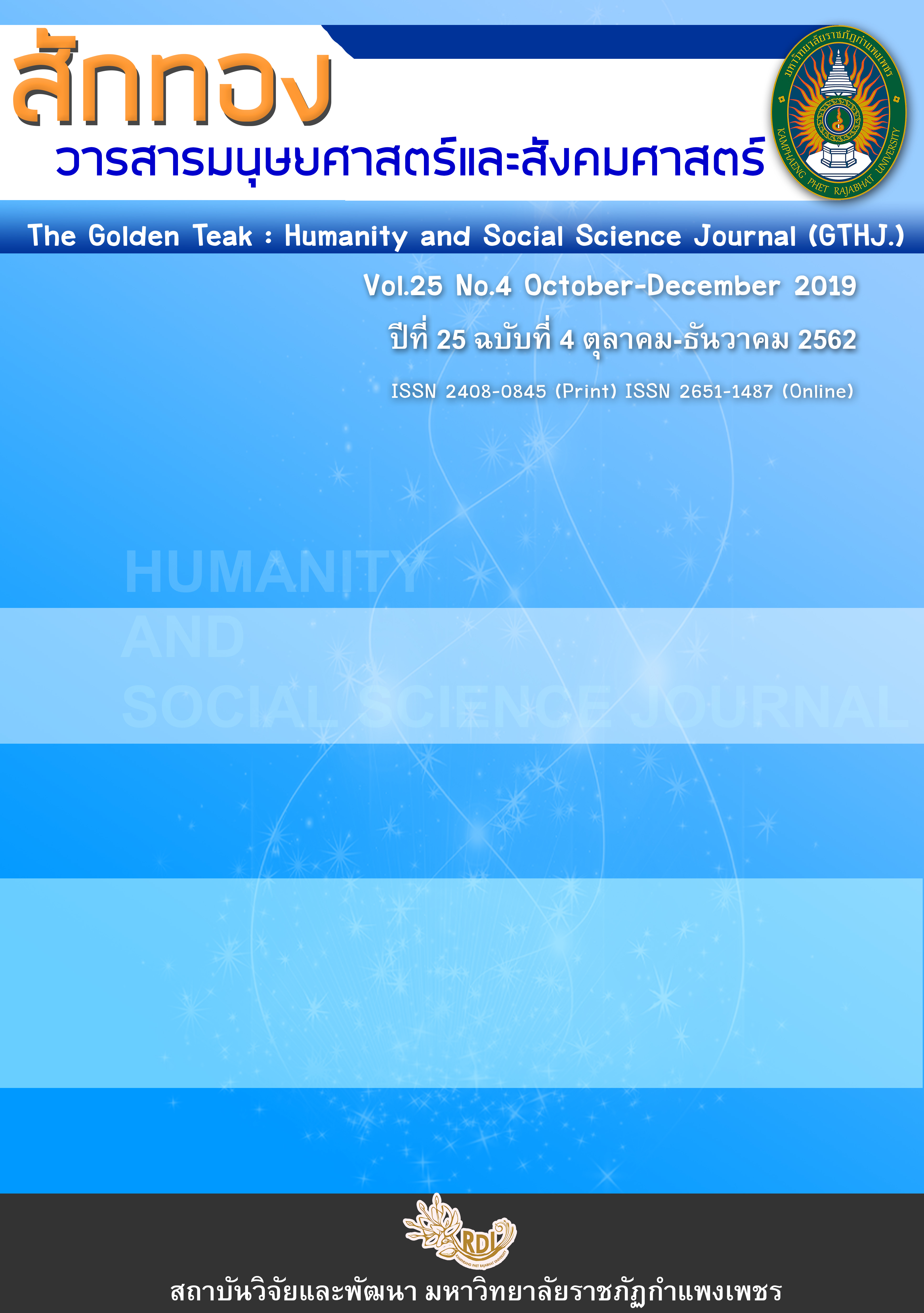Development of the Electronic Books for Teachers to Manage Integrative Thinking Instruction for 21st Century Students
Main Article Content
Abstract
This research and development aimed to 1) explore teachers’ opinions towards thinking skills required for managing integrative thinking instruction for 21st century students; 2) develop the electronic books for teachers to manage integrative thinking instruction; and 3) investigate the effectiveness of the developed electronic books in terms of knowledge and design of integrative thinking lesson plans, teachers’ opinions towards the developed electronic books, evaluation of students’ integrative thinking, and students’ opinions towards integrative thinking instruction. The samples were 1) 24 teachers from 4 learning areas: science, mathematics, foreign languages, and Thai language; the school were selected purposively and 6 teachers from each learning area were selected using a simple random sampling method; 2) students from 8 classes, randomly selected from classes of the teacher sampling group, 2 classes from each learning area, totaling 275 students. The research instruments included 1) the opinion questionnaires, 2) the electronic books, 3) the content validity checklist (IOC), 4) the cognitive assessment form for integrative thinking instruction, and 5) the assessment form for the ability to design integrative thinking lesson plans, 6) the assessment form for students’ integrative thinking, 7) the structure interview. Statistics used in this research were the percentage, IOC, mean scores, standard deviation, t-test for dependent samples, and z-test. The findings revealed that 1) the electronic books consisted of 3 sets of interactive books including fundamental thinking skills leading to integrative thinkers, development of integrative thinking skills, and evaluation of integrative thinking; 2) the average posttest scores of teachers’ knowledge concerning integrative thinking instruction after learning from the electronic books were significantly higher than those pretest scores at 0.05 level. Twenty-four teachers (100%) passed the set criteria of not less than 70% concerning knowledge and design of integrative thinking lesson plans. The level of teachers’ opinions towards the electronic books was at the highest level (=3.58, S.D.=0.34). The level of students’ opinions towards integrative thinking instruction was at the highest level (
=3.49, S.D.=0.33). The average scores of students’ integrative thinking were higher than the criteria of 70% at the 0.05 significance level. There were 210 students, which accounted for 76.23%, passing the set criteria at 70% on integrative thinking evaluation.
Article Details
บทความที่ได้รับการตีพิมพ์เป็นลิขสิทธิ์ของวารสาร สักทอง : วารสารมนุษยศาสตร์และสังคมศาสตร์ สถาบันวิจัยและพัฒนา มหาวิทยาลับราชภัฏกำแพงเพชร
ข้อคิดเห็นใดๆ ที่ปรากฎในวารสารเป็นวรรณกรรมของผู้เขียนโดยเฉพาะ ซึ่งมหาวิทยาลัยราชภัฏกำแพงเพชรและบรรณาธิการไม่จำเป็นต้องเห็นด้วย
References
System for Prathom Suksa 2 Students. Master of Education in Curriculum, Teaching, and Learning Technology, Chiang Mai University.
Charoenwongsak, K. (2011). Integrative Thinking. Bangkok : Success Media.
Harnmongkolpipat, P. (2017). Principles of Statistics 1. (7 th ed.). Bangkok : Kasetsart
University Press.
Jaithiang, A. (2010). Principles of Teaching. (5 th ed.). Bangkok : O.S. Printing House.
Klaisang, J. (2012). Publishing for E-book: Enhancement of Quest for Knowledge for
Digital Learners. Bangkok : Chulalongkorn University Press.
Khammanee, T. (2009). Science of Teaching : Knowledge for Effective Learning
Management. (3 rd ed.). Bangkok : Chulalongkorn University Press.
Khammanee, T. (2015). Unlocking the Philosophy of Sufficiency Economy to the Teaching
of Thinking Process. Bangkok : Chulalongkorn University Press.
Leekijwattana, P. (2010). Research Methods in Education. (6 th ed.). Bangkok : Mean Service
Supply.
Ministry of Education. (2007). The National Education Act B.E. 2542 (1999) and
Amendments (Second National Education Act B.E. 2545 (2002) and Amendments (Third National Education Act B.E. 2553 (2010). Bangkok : Prikwarn Graphic.
Panich, V. (2012). Ways to Cultivate Learning for Learners in the 21st Century. Bangkok :
Sodsri-Saritwong Foundation.
Panich, V. (2013). Cultivating Learning for the 21st Century. Bangkok : SCB Foundation.
Partnership for 21st Century Skills. (2007). Framework for 21 Century Learning. [Online].
Available : http://www.p21/org/our-work/p21-framework [2017, July 10].
Quality Learning Foundation. (2014). Classroom for the New Century. In Paper on the
National Conference titled “Learning Revolution…Thailand’s Turning Point”,
6-8 May 2014. Bangkok : Quality Learning Foundation.
_______. (2014). Elevating Thai Teachers’ Quality in the 21st Century. In Paper on the
National Conference titled “Learning Revolution…Thailand’s Turning Point”,
6-8 May 2014. Bangkok : Quality Learning Foundation.
Ritjaroon, P. (2013). Measurement and Evaluation in Education. (8 th ed.). Bangkok :
House of Kermyst.
Ruangrong, P. (2014). Development of E-book on Laptop and E-book on Tablet PC.
Bangkok : Pornthicha Printing.
Ruangsuwan, C. (2008). Development of Courseware and Web-based Instruction.
(12 th ed.). Mahasarakham : Faculty of Education, Mahasarakham University.
Sheffield, C.C. (2007). Technology and the Gifted Adolescent : Higher Order Thinking, 21st
Century Literacy, and the Digital Native. [Online]. Available :
http://www.ncsu.edu/meridian/sum2007/gifed/02.htm [2017, July 12].
Sinlarat, P. (2013). Six Obstacles of Thai Teachers. [Online]. Available :
www.prachachat.net/news_detail.php?newsid=1358828993 [2017, November 10].
Sinthapanon, S., et al. (2012). Development of Thinking Based on the Education Reform.
Bangkok : 9119 Technic Printing.
Songkram, N. (2010). Multimedia for Learning : Design and Development. Bangkok :
Chulalongkorn University Press.
Srifa, P. (2008). Talking E-book. Bangkok : Than Printing Company Limited.
Srisaard, B. (2003). Research for Teachers. Bangkok : Suviriyasarn.
Susaorat, P. (2013). Thinking Development. (5 th ed.). Bangkok : 9119 Technic Printing.


